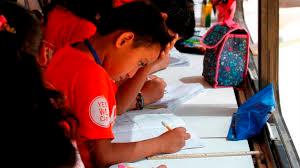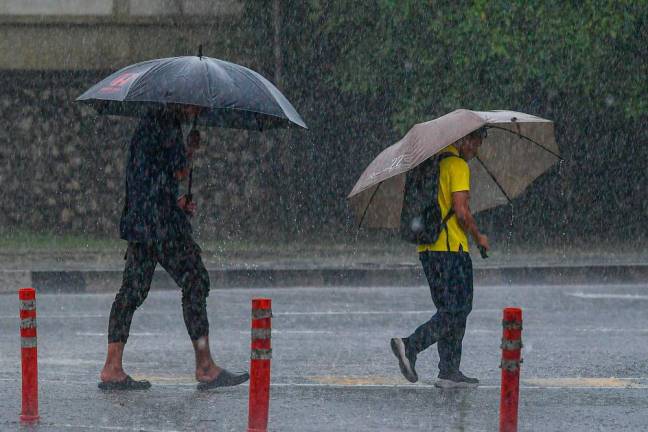KUALA LUMPUR: Five-year-old Noah has stopped talking.
Having spent most of his life in Malaysia, he had recently moved to Brunei with his mother and two sisters to join his father who works there. It is only the latest thing he has had to adapt to in the space of one year, with the Covid-19 pandemic and the resulting restrictions that have played havoc with his daily routine.
His reticence worries his mother Nurul Che Hashim.
“Before we would hear him say more, but now he’s a bit on the quiet side. When we ask him, ‘Do you want water?’, he wouldn’t answer. Usually, he would say, ‘Water. Water.’ But he doesn’t say that anymore,” she said.
Noah has Autism Spectrum Disorder (ASD), a neurological and developmental disorder that impacts one’s social and communication skills, behaviour and ability to learn. Some of the behaviours that characterise the disability include having trouble relating to or understanding others’ feelings, difficulty expressing their needs, losing skills with disuse and trouble adapting to changes in their routine.
Since Covid-19 is not showing any sign of abating soon, Noah and other children with neurodevelopmental disorders, especially those under the age of 12, are in danger of losing the critical years when they learn the skills they need to be self-sufficient and be part of society.
Depending on the severity of their condition, children on the spectrum need to learn how to understand and carry out verbal commands, communicate their needs and feelings verbally, as well as learn self-care skills, such as how to feed themselves and go to the toilet, from specially-trained educators.
Cases range from severe, requiring constant care, to mild, which sometimes go undetected. Many others, with intervention, become high-functioning individuals and able to fit in society.
Without these life skills, however, they would get frustrated and act out, sometimes hurting themselves and others.
According to 2019 figures from the World Health Organisation, one out of 160 children worldwide are on the spectrum. Malaysia does not have any data on the prevalence of ASD within the population, although a small-scale study released in 2014 put it at one out of 625 children between the ages of 18 and 26 months.
Children with ASD can also have Attention Deficit Hyperactive Disorder (ADHD), another neurodevelopmental disorder that impacts the way a brain develops. People with ADHD have problems focusing and controlling their emotions, thus affecting their ability to relate to others if left untreated.
Regression
The pandemic and its restrictions have created a Catch-22 situation for special needs children. Due to their disorder, these kids are the least likely to be able to do remote learning.
“They are really distracted by anything near them. It’s one of the most common symptoms of autism,” said Dalinah Gabda, a teacher with the National Autism Society of Malaysia (NASOM), a non-profit organisation that provides counselling and intervention therapies for people with ASD.
Experts say in-person learning works best with children on the spectrum and other neurotypical disorders. According to Harvard Medical School, in-person learning provides benefits such as a social environment with peers and physical access to services, and allows teachers to control the learning environment and accommodate students as needed.
However, it is risky to have these kids attending classes and therapy sessions as they are unlikely to comply with public health restrictions, such as wearing a mask and social distancing.
The pattern of shutting schools and therapy centres and then reopening only to shut down again depending on the state of the Covid-19 situation in Malaysia, has not been good for them either. In 2020, students have attended schools in person for about five to six months in total.
Teachers and child experts have been reporting some regression, a term used to describe a step back in a skill or behaviour that the children have previously mastered such as potty training or the ability to dress themselves.
“Regression is a real issue. When children are in distress ... it’s exacerbated in kids with disabilities,” said Nadiah Hanim Abdul Latif, advocate for children with disabilities at the Ministry of Women, Family and Community Development.
Dalinah agreed, saying the disruptions to the children’s schedule were interfering with their development.
“Autistic children need routine. They lose their routine, then they will lose their learning development,” she said.
She said the pandemic has also made it harder for parents as it requires them to be even more involved than usual to ensure lessons learned would be reinforced at home.
As such, a few students have had to restart their syllabus when the centres reopened, either because they have not been able to attend sessions or forgot their lessons.
Overwhelmed
Many families with special needs children have been struggling, trying hard to cope with the extra work that the pandemic has bestowed on them.
Work that is usually spread among teachers, therapists and extended family members – if they are lucky – is now the sole responsibility of the parent.
One such example is Maisurah Amir, who has become a special needs teacher and therapist, on top of primary caregiver, to her daughter Auni Farzana Azizam. For almost a year, she has been homeschooling 10-year old Auni, first because the government shut down all schools and later, because she feared Auni would catch the coronavirus.
Despite being a high school teacher, Maisurah admitted it was not easy to get Auni, who is partially verbal, to sit down and go through the lessons and exercises her teachers had sent her.
“We can’t follow the timetable ... but so far, she has been able to follow (the lessons). It’s just that we have to follow her schedule, wait until she becomes emotionally ready to study,” she said.
She also said parents who did not have similar backgrounds or resources would find it even harder to cope.
A few parents have reported feeling suicidal trying to deal with the stress, according to Nadiah. She added there was already a dearth of accessible and affordable social support and training systems to ease their burden in normal times, let alone during a pandemic.
“Having a child with a condition or disability in Malaysia is not cheap. Because our social services, even though we have universal healthcare, is very basic,” she said, adding that it was important to take care of caregivers too.
For example, the Social Welfare Department of Malaysia provides a monthly allowance of RM150 per special needs child but therapy sessions at NASOM, a non-profit centre, costs RM120 per hour, for example. Therapies at private centres, such as Autism Link Malaysia, can cost between RM1,000 to RM10,000 a month.
The government also provides medical and some supportive care via public hospitals and clinics. While the cost is almost free, it can take weeks or months to get an appointment.
In the end, special needs children are usually solely dependent on their families. Although there are shelters that will take in special needs children and adults, space is in short supply and resources are limited.
Preparing for the future
Considering parents are now expected to work, take care of the house and any other children they have and supervise their children’s studies, neurotypical and special needs, alike, it is hardly surprising when parents take shortcuts.
Some parents have admitted to putting a diaper on their special needs children, rather than supervising them as they go to the bathroom each time to save time.
This may end up backfiring, however, as kids who regress may not be able to relearn skills and behaviours they had previously mastered. And if they did, it would mean taking up precious time that could have been spent to develop other necessary skills.
Nurul, who became a stay-at-home mom when her son Noah was born, fears the pandemic will end up preventing children with neurodevelopmental disorders from becoming as independent and functional as they could.
“If we don’t do intervention therapy right now, what happens to this generation 10 to 20 years down the road?” she said, adding that Noah’s development had stalled last year.
Maisurah also worries the pandemic would leave a lasting effect on her daughter’s development, admitting the little girl has not progressed much.
“I hope she’ll be able to make up for it later (after the pandemic is over),” she said.
Experts say parents may have no choice but to involve siblings in the special needs children’s therapies and sessions as a way to reduce the workload on parents and stall the regression.
NASOM psychologist Grace Liew said they have always encouraged siblings to help out, not just during the pandemic, but also as preparation for the future.
“Even if not a severe case, we need to think about the future. Like, who will be supporting them if not the siblings?” she said.
Maisurah understood but wished she did not have to depend so much on her eldest son Afif Baqir for childcare during the pandemic. The 13-year old boy helps to take care of Auni when she and her husband have to go to work.
“It’s a lot of responsibility, but we have to do it,” she said. -Bernama













